
Featured Collaborator for December: Ann Tenbrunsel
BlogInterview with Ann Tenbrunsel, the David E. Gallo Professor of Business Ethics at the Mendoza School of Business at the University of Notre Dame, and co-author of Blindspots
What are your main areas of research?
My work has focused on why individuals behave in ways that deviate from their values and are not aware that they are doing so. Within that domain, I have focused on how the situation leads to "ethical fading" in which people do not realize they are in fact presented with an ethical decision. If you don't realize you are faced with an ethical dilemma, then your ethical values and principles wont be part of the decision process. I have examined individual level factors-- temptation, forecasting errors, construal level, moral self-image and power-- as well as organizational level factors-- business framing, sanctions,perceived retaliation, organizational cultures of justice and respect, formal and informal communications-- that may influence unethical behavior.
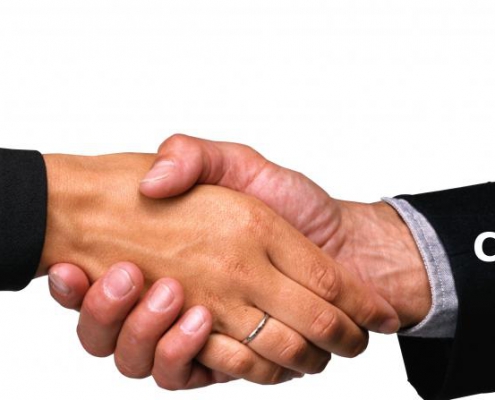
Reforming Culture and Behavior in the Financial Services Industry Conference
Blog The Reforming Culture and Behavior in the Financial Services Industry Conference last week at the Federal Reserve Bank of New York* demonstrated that today’s financial industry understands the need for culture and behavior change in order to run a more ethical company. After spending many years focused on implementing compliance programs, there is now an complementary understanding of the role of ethics and its important function in shaping culture and reputation. The financial industry, however, must confront the bigger challenge of finding ways to actually change behavior.
The Reforming Culture and Behavior in the Financial Services Industry Conference last week at the Federal Reserve Bank of New York* demonstrated that today’s financial industry understands the need for culture and behavior change in order to run a more ethical company. After spending many years focused on implementing compliance programs, there is now an complementary understanding of the role of ethics and its important function in shaping culture and reputation. The financial industry, however, must confront the bigger challenge of finding ways to actually change behavior.

Ethical Systems Design is the Red Pill for Reducing Inequality
BlogPart 2 of Jonathan Haidt's post on his recent talk at the Aspen Ideas Festival. Read Part 1 here.
 A friend of Mark Twain once said, “Everybody talks about the weather, but nobody does anything about it.” Rising inequality is similar. Many on the left urge policies that would redistribute wealth more effectively, such as raising the top marginal tax rates. Some on the right have begun talking about inequality, and they propose policies that would encourage entrepreneurialism among the poor and working class, such as clearing away licensing restrictions on hairdressers and other small businesses.
A friend of Mark Twain once said, “Everybody talks about the weather, but nobody does anything about it.” Rising inequality is similar. Many on the left urge policies that would redistribute wealth more effectively, such as raising the top marginal tax rates. Some on the right have begun talking about inequality, and they propose policies that would encourage entrepreneurialism among the poor and working class, such as clearing away licensing restrictions on hairdressers and other small businesses.
Yet given the politically charged nature of this debate, neither side is going to get a chance to try its policies unless it gets control of the Oval Office and both houses of Congress.
Aren’t there any new ideas out there? Isn’t there anything that both sides might support? How about…better business ethics, achieved with little or no new regulation? How about Ethical Systems Design?

Buddha Makes the Business Case for Business Ethics
Blog Part 1 of 2 on my talk at the 2015 Aspen Ideas Festival.
Part 1 of 2 on my talk at the 2015 Aspen Ideas Festival.
In just the last few years, there has been a lot of new research showing when and why ethics pays. I recently pulled this evidence together for a talk I gave at the Aspen Ideas Festival. I set up the argument by quoting Buddha’s version of the business case:
Set your heart on doing good.
Do it over and over again, and you will be filled with joy.
A fool is happy until his mischief turns against him.
And a good man may suffer until his goodness flowers.

Featured Collaborator for November: David Hirshleifer
Blog Interview with David Hirshleifer, Professor of Finance and Merage Chair in Business Growth, University of California-Irvine
Interview with David Hirshleifer, Professor of Finance and Merage Chair in Business Growth, University of California-Irvine
What are your main areas of research?
I do research in behavioral finance, economics, accounting, and social science more generally. My main focus in recent years has been on how social interactions affect behavior, and on the cultural transmission of beliefs and behavior.
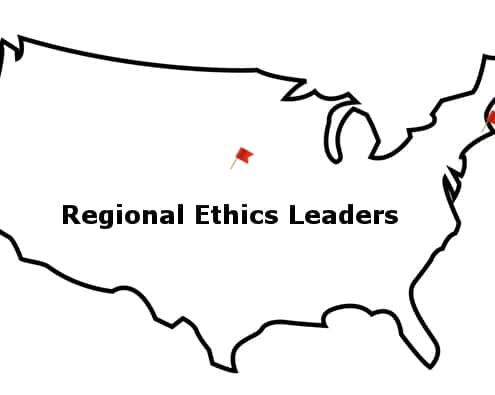
Ethics and the City: Regional programs for success
Blog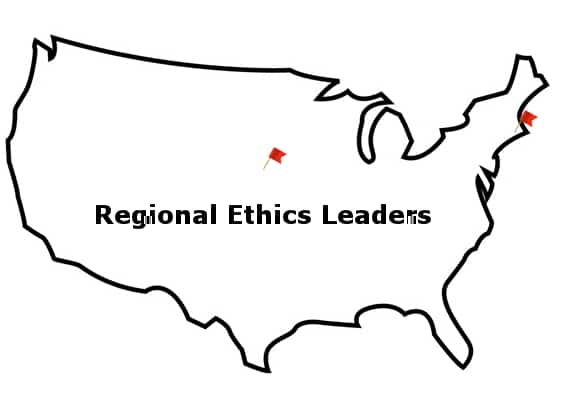 Ethical systems design is rooted in a systems-approach. We at Ethical Systems generally look at these at 3 levels: 1) personal ethics; 2) organizational ethics; and 3) the national culture and legal/regulatory environment. It is the interplay between these levels that creates a self-sustaining ethical culture.
Ethical systems design is rooted in a systems-approach. We at Ethical Systems generally look at these at 3 levels: 1) personal ethics; 2) organizational ethics; and 3) the national culture and legal/regulatory environment. It is the interplay between these levels that creates a self-sustaining ethical culture.
Within the context of the third level, there is an emerging trend, where ethics and culture are being used to promote regional economic development. Ethics is taking center stage in two cities- Boston and Omaha- and galvanizing people to come together to engage in discussion and identify solutions.
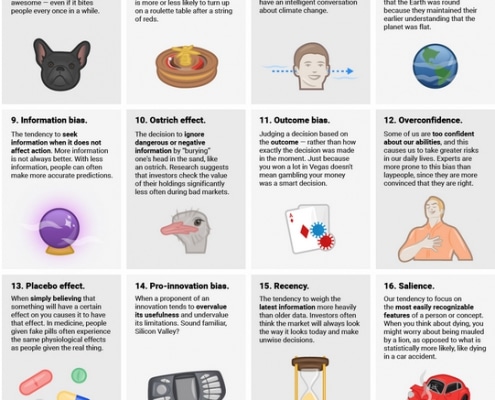
Biases and Decision Making
Blog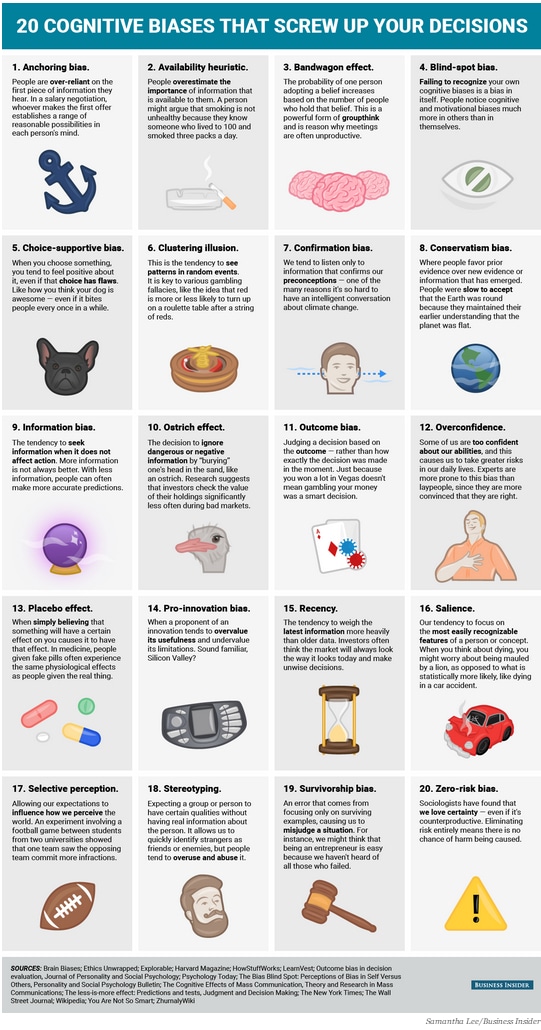 From the things we say to the actions we take each day, our world- and that of business- is comprised of thousands of decisions, both big and small. How we come to make those decisions is the result of intuition and analysis and, in most cases, influenced by biases that we may or may not be aware of.
From the things we say to the actions we take each day, our world- and that of business- is comprised of thousands of decisions, both big and small. How we come to make those decisions is the result of intuition and analysis and, in most cases, influenced by biases that we may or may not be aware of.
We know about blind spots in decision making, mostly because of the work of ES collaborators Max Bazerman and Ann Tenbrunsel. A recent graph published in Business Insider: Australia, and included below, depicts additional biases that all would be wise to learn and attempt to obviate when analyzing ideas and programs.
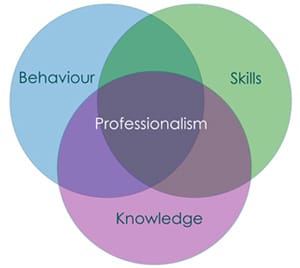
Professionalism and Ethics: A missed connection?
Blog What does professionalism mean to you? Often, people who identify as a professional think of themselves not only as knowledgeable in their discipline, but also rational, objective and serving a higher purpose (e.g., the client’s needs). These are laudable goals, but new research shows that these characteristics could actually lead to people making self-interested, and ultimately unethical or damaging, decisions.
What does professionalism mean to you? Often, people who identify as a professional think of themselves not only as knowledgeable in their discipline, but also rational, objective and serving a higher purpose (e.g., the client’s needs). These are laudable goals, but new research shows that these characteristics could actually lead to people making self-interested, and ultimately unethical or damaging, decisions.
In a paper on Professionalism and Moral Behavior, Maryam Kouchaki of the Kellogg School of Management at Northwestern University, tests the hypothesis that an emphasis on one's professional identity has a greater likelihood of an individual engaging in unethical behavior. This is an important inquiry in light of ethical failures in companies where lawyers and accountants often act as “gatekeepers” on ethics and compliance issues vis a vis corporate practices. Based on evidence from her lab studies and employee surveys, Kouchaki concludes that priming professionalism may actually lead to increased misbehavior.

Very Worrying: VW, Leadership and Ethical Culture
BlogGuest post from Dennis Gentilin of the National Australia Bank and author of the forthcoming book, “The Origins of Ethical Failures”
 As we all know, last week the car manufacturer Volkswagen admitted to installing software in over 11 million of their diesel engine cars that was designed to cheat emission tests. At worst, some commentators have suggested that Volkswagen are responsible for the premature death of people with respiratory conditions. At best, it is extraordinarily deceitful and unethical conduct.
As we all know, last week the car manufacturer Volkswagen admitted to installing software in over 11 million of their diesel engine cars that was designed to cheat emission tests. At worst, some commentators have suggested that Volkswagen are responsible for the premature death of people with respiratory conditions. At best, it is extraordinarily deceitful and unethical conduct.
It is highly unlikely that a scandal of this magnitude is the work of a handful of rogues. Rather it points to a systemic disrespect for principled conduct at numerous levels of the organization. No doubt the pending investigation will uncover failures in governance and compliance. However, as with all corporate scandals of this nature, my hypothesis is that at least one (or some) of the following five factors would have been at play:

Bad Apples, Bad Barrels or Bad Barrel Makers?
Blog The prominence of compliance in organizations continues to rise. Recently, the US Department of Justice (DOJ) named Ms. Hui Chen as its Compliance Counsel- a much anticipated new role which many have applauded as a step forward for addressing the criticism that the DOJ doesn’t appropriately credit companies who implement effective compliance programs.
The prominence of compliance in organizations continues to rise. Recently, the US Department of Justice (DOJ) named Ms. Hui Chen as its Compliance Counsel- a much anticipated new role which many have applauded as a step forward for addressing the criticism that the DOJ doesn’t appropriately credit companies who implement effective compliance programs.
Ms. Chen comes well prepared from a background in both corporate compliance and prosecution, which she will likely lean heavily upon when tackling the difficult task of helping prosecutors recognize whether an incident is symptomatic of an unethical corporate culture or the result of a rogue employee. This is the distinction that has challenged social psychologists for decades: is it the individual or the system that is to blame?
